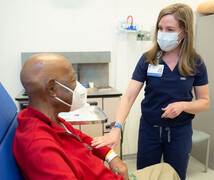Aphasia is a language disorder that can affect comprehension and communication. Although it is most often caused by a stroke, aphasia can also result from traumatic brain injury, brain tumors, or progressive neurological disorders such as primary progressive aphasia (PPA). These conditions damage the language centers of the brain, leading to difficulties with speaking, understanding, reading, and/or writing.
Learning to communicate with someone who has aphasia can positively impact that person's social interactions, relationships, medical decision-making, and overall wellbeing. "We work with patients and their care partners to provide customized treatment plans focusing on life participation and maximizing communication success," says Meredith Nye, CCC-SLP, MS, a Duke speech-language pathologist.
“Aphasia doesn’t impact a person’s hearing or thinking skills like memory. Rather," she says, "people with aphasia may use the wrong word, like 'mother' instead of 'daughter' or 'yes' instead of 'no.' Or they may make up words, unintentionally repeat themselves, or only be able to say a few words or sounds when they are trying to communicate. Or they may have a hard time understanding what you're saying."
How to Communicate with Someone with Aphasia
Speech pathologists can help relatives and friends work with a loved one who has aphasia and find ways to communicate effectively. Nye recommends keeping these tips in mind:
Focus Their Attention
If possible, move your conversation to a quiet, well-lit room where there are no distractions. Turn off background disturbances like the radio or television. It’s best to limit conversation to one or two people at the most.
Use All Forms of Nonverbal Communication
Rather than rely on words, use a wave to say “goodbye” or “hello.” Thumbs up can be used to say “good job” or “yes.” Your facial expressions can show anger, sadness, or elation. Exchange written or drawn messages.
Have Patience
Sometimes it takes longer for a person with aphasia to communicate. Count to 10 slowly before providing help or choices. Many times it takes that much time or longer for them to get their message out.
Confirm Your Understanding
After an exchange with your loved one, make sure you understand by verbally repeating or by writing a synopsis of the message’s key points. If they wanted coffee, write “coffee” and draw a picture. Use intonation in your voice when you ask, “You want coffee?” and point to the picture. Have them answer yes or no.
Use Technology
Computers, smart devices, and other forms of technology can help people with aphasia return to hobbies, read, and converse with others. Icons and emojis can enhance email and social media conversations. Encourage your loved one to listen to audiobooks in addition to reading the print versions. Speech pathologists can also recommend programs that enable your loved one to use word-prediction or speech-to-text capabilities.
Get Help
Speech pathologists can help people make progress even years after they are originally diagnosed with aphasia, says Nye. “We can help them focus on their strengths and find ways to better engage with family and their community. We can offer tools to help them socialize and have a better quality of life through communication.”
Find Aphasia Support Groups
There are many groups and resources in the community to support people with aphasia and their families. Nye says a speech-language pathologist is your best resource for identifying groups in your area.





